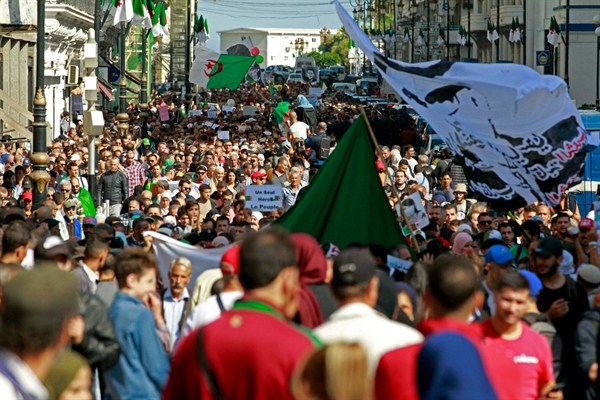Mass protests are unfolding across the Middle East and North Africa, as demonstrators take to the streets to decry a wide range of social and political ills. From Algiers to Khartoum, Beirut to Baghdad, the list of grievances includes rampant corruption, economic malaise, oppression and sectarian divisions.
The protests have already resulted in the ouster of two leaders this year, in Sudan and Algeria. In other countries, demonstrators have clashed with security forces, resulting in hundreds of deaths and injuries, and many more arrests. Given their wide geographic scope, the protests have drawn comparisons to the Arab uprisings that swept across the region in 2010 and 2011.
For this week’s interview on Trend Lines, WPR’s Elliot Waldman is joined from Beirut by Maha Yahya, director of the Carnegie Middle East Center, for a conversation about the root causes of these mass protests and where they might lead.
If you like what you hear on Trend Lines and what you’ve read on WPR, you can sign up for our free newsletter to get our uncompromising analysis delivered straight to your inbox. The newsletter offers a free preview article every day of the week, plus three more complimentary articles in our weekly roundup every Friday. Sign up here. Then subscribe.
Listen:
Download: MP3
Subscribe: iTunes | RSS | Spotify
Relevant Articles on WPR:
Lebanon’s Protests Are a Popular Outcry Cutting Across Sectarian Lines
How Recent Protests Exposed the Authoritarian Fragility of Sisi’s Egypt
After Bouteflika’s Ouster, Algeria’s Popular Uprising Faces a Much Bigger Test
What’s Next for Sudan’s Fragile Democratic Transition?
Trend Lines is produced and edited by Peter Dörrie, a freelance journalist and analyst focusing on security and resource politics in Africa. You can follow him on Twitter at @peterdoerrie.
To send feedback or questions, email us at podcast@worldpoliticsreview.com.

